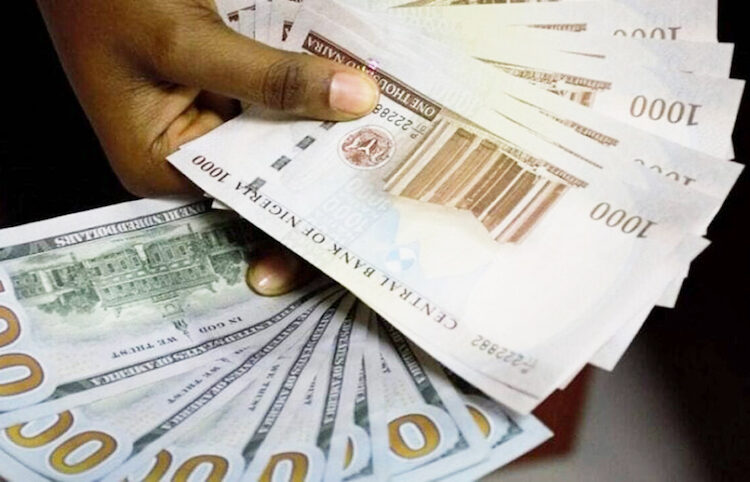The Central Bank of Nigeria has issued a circular addressed to Bureau De Change operators (BDCs), revealing that each BDC has been allocated $10,000 at a rate of N1,251/$1.
According to the circular, which was released on Monday, the BDCs are mandated to sell the allocated dollars to eligible customers at a rate not exceeding 1.5 per cent above the purchase price, indicating that BDCs are expected to sell at a maximum of N1,269/$1.
The central bank failed to state how many BDCs got the Forex allocation.
This is as the value of the naira resumed its appreciation on the Nigeria Autonomous Foreign Exchange Market (NAFEM) closing on Monday at N1,408.04 to the dollar.
This is N14.81 or 1.04 per cent appreciation compared to N1,422.85 to the dollar when it began the day’s trading activities.
The appreciation is connected to the CBN’s recent policies aimed at rescuing the nation’s currency that has nosedived in value in recent times.
Recently, the apex bank cleared the dollars backlog, in a move to give confidence to foreign investors to further increase their level of Investments in the country
The circular states, “We refer to our letter to you referenced TED/DIR/CON/GOM/001/071 in respect of the above subject wherein the CB approved a second tranche of sale of FX to eligible BDCs.
“We write to inform you of the sale of $10,000 to each BDC at the rate of N1,251/$1. The BDCs are to sell to eligible end users at a spread of NOT MORE THAN 1.5 per cent above the purchase price.”
This announcement marks the resumption of dollar sales to BDC operators after a prolonged ban imposed by the central bank in 2021. The ban was lifted earlier this year following the revocation of licences of over 4,173 BDC operators in February
Meanwhile, some financial experts have commended the federal government for some of its monetary policies that have led to the steady appreciation of the Naira against the dollar.
The Naira which had depreciated to all-time low of N1900/$1 gradually appreciated after the last Monetary Policy Committee (MPC) meeting of the Central Bank of Nigeria (CBN), exchanging at N1,405 to the dollar at the official Nigerian Autonomous Foreign Exchange Market (NAFEM) window and N1,450 to the dollar at the parallel market on Monday.
According to a past president of the Chartered Institute of Bankers of Nigeria (CIBN), Okechukwu Unegbu, the aggressive monetary policy tightening adopted by the CBN appears to be paying off.
Unegbu urged the apex bank to continue its monetary policy tightening, while improving forex liquidity.
“A lot of people criticised the aggressive monetary policy tightening on the CBN, but it seems to be paying off.
“It is not yet time to celebrate, though I urge the CBN to do more to improve dollar liquidity and further push down the dollar exchange rate,’’ he said.
He said that the action against Binance, a global company that operates the largest crypto currency exchange, had also yielded positive results.
A securities and financial regulation expert, Dr Wunmi Bewaji said that the current momentum of Nigeria’s Naira against the dollar was sustainable.
According to Bewaji, the dollar is likely to decline rapidly at a point in time in the next few weeks.
He traced the recent noticeable success of the Naira to some drastic steps taken by the federal government, most noticeably on Binance.
“I think this momentum is sustainable and the dollar is likely to decline rapidly at a point in time in the next few weeks,’’ he said.
The chief executive officer of Financial Derivatives, Bismark Rewane, said that the exchange rate was sustainable as long as the right things were done.
“Interest rates have been increased, therefore, the propensity to save has increased, and the propensity to consume has reduced. People are consuming less and saving more.
“The government itself is consuming less and saving more,” he said.
He said that there was a need for new money.
“New money is a function of confidence. Confidence is a function of consistency in policy. These are the things that the government has to come to terms with,’’ he said.
According to the director, Institute of Capital Market Studies at the Nasarawa State University, Keffi, Prof. Uche Uwaleke, inflationary pressure has persisted in spite of moderation in exchange rate.
Uwaleke complained that headline inflation had remained stubbornly elevated, climbing above 30 per cent, way ahead of the CBN’s target of 21.4 per cent for 2024.
He urged the apex bank to stop further tightening of the rates.
An economist, Dr Chijioke Ekechukwu, said that the improvement in exchange rate came from an increase in foreign currency supply.
“We need to isolate the impact of the recent tightening, in order to determine the impact of the other factors on the exchange rate and inflation rate,’’ he said.





